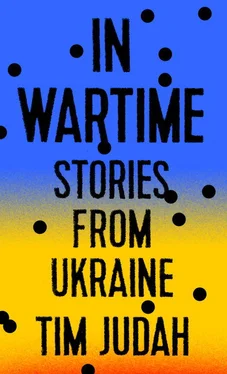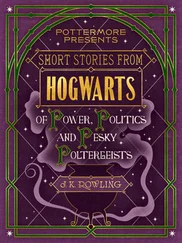24.
The Welsh and the Wild East
Donetsk is the epicenter of the conflict. It has always had a reputation as a rough and ready kind of place, though before the war, during the 2012 UEFA European Championship soccer matches, for example, there would be no reason for a foreigner at least to know this. It has a superb, even beautiful modern soccer stadium, the home of Shakhtar Donetsk, the team owned, like so much else of value here, by Rinat Akhmetov. (Shakhtar means “miner.” Since the beginning of the war the team has gone into exile, playing their “home” matches in Lviv.) The town center is pleasant and families and friends like to stroll and bike along its lakeshore. In fact, said Liliia Ivaschenko, aged twenty-six, when she worked for the brewers Carlsberg, looking after its guests during the five Euro 2012 matches played in Donetsk, she really felt that her city had made it, that its difficult two decades of transition from communism were over, and that even if its politics and business verged on the thuggish, somehow Donetsk was not such a bad place to live in after all.
Before the war the city was home to some 900,000 people. But, as in Lviv, though for completely different reasons, almost nobody here can trace their ancestry back more than a couple of generations. Until 1870, there was nothing here except for the nearby village of Alexandrovskaya. This was windblown steppe and sparsely populated as a result of three centuries of Tatar slave raiding. The region was taken by Catherine the Great in the late eighteenth century and became part of her dominion of New Russia, or Novorossiya. Not much happened here on the steppe until Russia lost the Crimean War in 1856 and its leaders realized they needed to modernize, industrialize and build railways to connect the expanding but disparate parts of the empire. What happened next was perhaps serendipity. Two Russian envoys dispatched to London to discuss modern steel fortifications for the Kronstadt fort near St. Petersburg met a Welshman called John Hughes, who ran a factory which could make them in Millwall in east London. Hughes could barely read or write but he was a smart man, which was why he was running the factory. They discussed the fact that there was coal and iron ore in the Donbas region. As Hughes came from south Wales, his background was steeped in these industries, so he decided to explore the possibilities there.
By 1869 the New Russia Company was formed, investors were committed, permissions, leases and titles negotiated and the following year Hughes, plus a group of some 150 mainly Welsh specialists, set sail for the Sea of Azov. From Taganrog, now in Russia, their equipment was hauled up by ox-train to where Hughes had decided to mine and work. And so Donetsk, or Hughesovka as it was called until after the Russian Revolution, was born. The coal was good quality and Hughes concentrated on producing rails for the rapidly expanding Russian railway network. At first it was hard to find enough workers, but he made sure their conditions were better than in other places, even if not great, and Hughes’s city began to grow. In 1871 it had a population of 480. By 1884 this number had grown to 5,500, by 1901 to 36,000 and by 1916 to 70,000. A 1917 census found that Russians were the largest single group in the city, followed by Jews and a third were Ukrainians.
According to Roderick Heather, who wrote a biography of Hughes published in 2010: “The industrialisation of the Donbass started by Hughes initiated a wave of migration in the latter part of the nineteenth century.” As a whole, “Ukrainians showed much less enthusiasm for migration to the new Donbass mining settlements and factory towns with only a third of new settlers coming from the neighboring Ukrainian regions.” There was a reason for this. Because relatively few lived on the steppe, those who did had comparatively large farms and hence there was less pressure on them to move for work in a period of rapid population growth. Thus, they tended to remain in the countryside, Russians became industrial workers and Jews worked in trade and were craftsmen. So, as Heather writes, the region “proved an attractive destination for people from the Russian provinces of Kursk, Orel, Voronezh, Tula, Smolensk, Samara and Belorussia as well as Greeks and Tatars from the Crimea, Croats from the Austro-Hungarian Empire, Serbs and Bulgarians from the Ottoman Empire, Germans, Austrians, Poles and Jews.” The result of this was the emergence in the Donbass of largely Russified towns set “against a Ukrainian rural backdrop.” Thus, he says:
it became increasingly rare to hear Ukrainian spoken in the towns like Hughesovka. Inevitably this ethnic melting pot led to friction and recurring clashes. The relations between Russians and Ukrainians were particularly strained in both towns and workers’ settlements, leading to confrontations and frequent knife fights. The Tatars and Muslims were often the victims of violence by Slavs and almost every strike or labor protest in the Donbass ended in violent riots and large scale anti-Jewish pogroms.
Today, oddly, the large and grand redbrick house in which Hughes lived with his family is a ruin. It is surrounded by a fence of wire and hedge. A stone’s throw away is the huge industrial complex which has descended from Hughes’s original mines and foundry. A local man I found working as a security guard nearby as I hunted for people who knew something about the building told me that, as long as he could remember—and he was a child after the Second World War—the building had been a ruin. Before the war, he thought it had been used as offices for the directors of the complex. In 1991 descendants of the Hughes family returned to visit the town and house and were told of plans to turn it into a museum.
In 1908 the fourteen-year-old Nikita Khrushchev, who was born in the village of Kalinovka in Russia, close to the modern border with Ukraine, joined his parents who had already moved here. William Taubman, his biographer, quotes Khrushchev as writing in 1958 that it seemed to him “that Karl Marx had actually been at the mines” and that “he had based his laws on what he had observed of our lives.” The British and other foreigners lived in what was called the “English colony,” which had, according to Taubman, “neat houses, treelined streets, electricity, and a central water system.” But ordinary miners and factory workers lived in settlements “known as Shanghais and Dogsvilles.” One of them was called “Bitch” and another “Croak.” In 1910, says Taubman, “residents hauled water from twenty-seven hand pumps scattered around town; the only pump house served the foreigners. Teeming barracks housed fifty to sixty men in each dormitory room.”
Cholera, typhoid and dysentery were frequent visitors to town. Using an alternative spelling for Hughesovka, Taubman notes that many of its residents “took refuge in drink and crime”:
In 1908 the town boasted no fewer than thirty-three wine and liquor shops. From these it was a short step to mayhem. The writer Konstantin Paustovsky, who spent a year in Yuzovka, witnessed fights that spread until “the whole street joined in. Men came out with leaded whips and knuckle dusters, noses were broken and blood flowed.” In 1912 a visiting journalist described Yuzovka this way: “All the dregs of mining industry life gather here. Everything is dark, evil and criminal-thieves, hooligans, all such are drawn here.”
The civil war and revolution saw the city change hands several times. The Donbass, like all of the wider region, was contested by the communists, the anti-revolutionary Whites, anarchists, supporters of Ukrainian independence and other groups. For a brief period German troops controlled the city. From December 1917 Red Guards and Whites clashed “in and around Hughesovka,” according to Heather, who notes why it was so hotly contested:
Читать дальше












